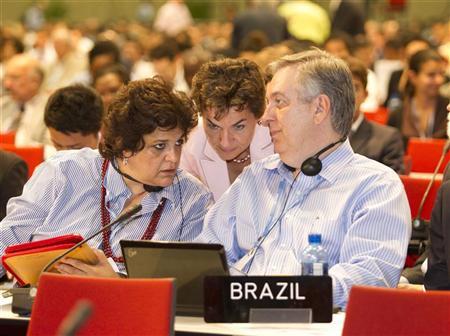Rich nations owe more to combating global climate change: Brazil
Date: 02-Oct-12
Country: USA
Author: Brian Winter

United Nations (UN) Framework Convention on Climate Change Executive
Secretary Christiana Figueres speaks with Brazil's Minister of
Environment Izabella Teixeira (L) and chief climate envoy Luiz
alberto Figueiredo during a plenary session at the United Na
Photo: Rogan Ward
Major emerging economies' obligations to cut emissions under a climate change agreement should not be the same as those of rich countries, Brazil's chief negotiator said, signaling a retreat to an old position that has hamstrung years of U.N. negotiations.
Ambassador Luiz Alberto Figueiredo Machado told Reuters during last week's U.N. General Assembly that Brazil is committed to working toward a global pact to cut emissions in both developed and developing nations as agreed at last year's climate talks in Durban, South Africa.
But Figueiredo said that agreement should adhere to the U.N.'s principle of "common but differentiated responsibilities," a line between developing and developed countries drawn in 1992 that enabled countries such as Brazil, China and India to escape mandatory carbon cuts, which the Durban summit had supposedly eliminated.
"Different countries would have different contributions in this fight against climate change, and these different contributions have to do with a number of factors of national circumstances," Figueiredo said, referring mainly to the belief that rich countries are responsible for "generating the problem."
The so-called BASIC bloc (Brazil, South Africa, India and China) in the U.N. climate negotiations stressed the point at a joint meeting in Brasilia last week to harmonize their position for the next round of negotiations in Doha, Qatar, which begin next month.
An agreement is to be formalized by 2015 and to take effect by 2020.
BUT WHOSE OBLIGATIONS?
The United States never ratified the Kyoto Protocol, the 1992 U.N. treaty that legally bound only developed countries to emission reduction targets because it did not place any obligations on the fast-growing economies, which are also major greenhouse gas emitters.
Todd Stern, the U.S. special envoy for climate change and head negotiator, has said the "common but differentiated" principle created an unwelcome "firewall" between developed and developing countries.
Following the conclusion of the Durban conference, Stern had praised the agreement for removing reference to the principle and said it reflected the "kind of symmetry" that the United States has pushed for since the start of the Obama administration in 2009.
Figueiredo stressed that the BASIC countries were not backsliding on what they had agreed in Durban or at previous summits in Copenhagen and Cancun where they pledged domestic voluntary commitments to curb carbon emissions.
"It is my hope that all countries would like to have a system that would recognize their own national needs and their national circumstances.
"If you factor that in, but also the need for a differentiation of action based on responsibility but also on capacity to act, there you may have the blueprint of something," he said.
FOSSIL FUEL SUBSIDIES
The ambassador said that the distinctions between developed and developing countries will also be necessary if the issue of fossil fuel subsidies - estimated to have been $409 billion in 2010 - is addressed in a future climate agreement.
In 2009, the leaders of the Group of 20 countries agreed to phase out inefficient fossil fuel subsidies by 2020.
They reiterated the pledge at the U.N. conference on sustainable development that Brazil hosted in Rio de Janeiro in June.
Figueiredo said the subsidies issue would need to be addressed in a "tailor-made" way to recognize that some developing countries cannot immediately ban them because they have given their populations access to modern forms of energy.
"I think this is a fair discussion," he said.
(Writing by Valerie Volcovici in Washington, additional reporting by Nina Chestney in London; Editing by Maureen Bavdek and Kenneth Barry)
![]()
© Thomson Reuters 2012 All rights reserved